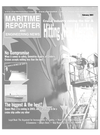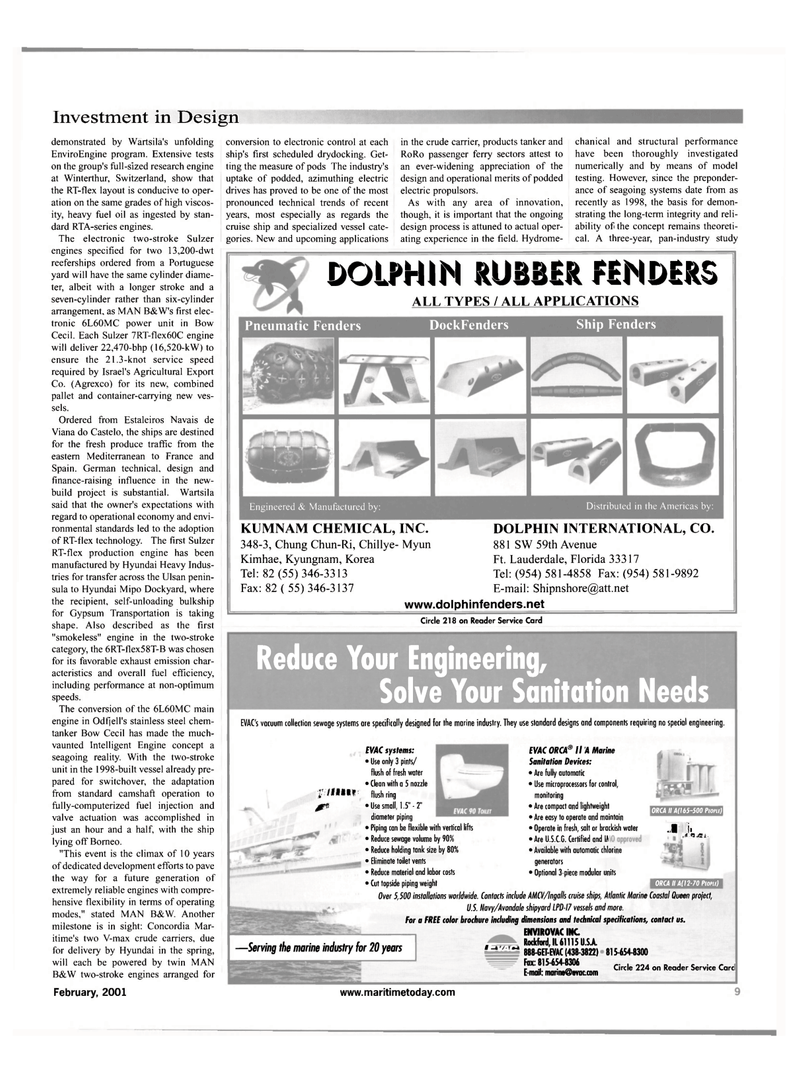
Page 9: of Maritime Reporter Magazine (February 2001)
Read this page in Pdf, Flash or Html5 edition of February 2001 Maritime Reporter Magazine
Investment in Design demonstrated by Wartsila's unfolding
EnviroEngine program. Extensive tests on the group's full-sized research engine at Winterthur, Switzerland, show that the RT-flex layout is conducive to oper- ation on the same grades of high viscos- ity, heavy fuel oil as ingested by stan- dard RTA-series engines.
The electronic two-stroke Sulzer engines specified for two 13,200-dwt reeferships ordered from a Portuguese yard will have the same cylinder diame- ter, albeit with a longer stroke and a seven-cylinder rather than six-cylinder arrangement, as MAN B&W's first elec- tronic 6L60MC power unit in Bow
Cecil. Each Sulzer 7RT-flex60C engine will deliver 22,470-bhp (16,520-kW) to ensure the 21.3-knot service speed required by Israel's Agricultural Export
Co. (Agrexco) for its new, combined pallet and container-carrying new ves- sels.
Ordered from Estaleiros Navais de
Viana do Castelo, the ships are destined for the fresh produce traffic from the eastern Mediterranean to France and
Spain. German technical, design and finance-raising influence in the new- build project is substantial. Wartsila said that the owner's expectations with regard to operational economy and envi- ronmental standards led to the adoption of RT-flex technology. The first Sulzer
RT-flex production engine has been manufactured by Hyundai Heavy Indus- tries for transfer across the Ulsan penin- sula to Hyundai Mipo Dockyard, where the recipient, self-unloading bulkship for Gypsum Transportation is taking shape. Also described as the first "smokeless" engine in the two-stroke category, the 6RT-flex58T-B was chosen for its favorable exhaust emission char- acteristics and overall fuel efficiency, including performance at non-optimum speeds.
The conversion of the 6L60MC main engine in Odfjell's stainless steel chem- tanker Bow Cecil has made the much- vaunted Intelligent Engine concept a seagoing reality. With the two-stroke unit in the 1998-built vessel already pre- pared for switchover, the adaptation from standard camshaft operation to fully-computerized fuel injection and valve actuation was accomplished in just an hour and a half, with the ship lying off Borneo. "This event is the climax of 10 years of dedicated development efforts to pave the way for a future generation of extremely reliable engines with compre- hensive flexibility in terms of operating modes," stated MAN B&W. Another milestone is in sight: Concordia Mar- itime's two V-max crude carriers, due for delivery by Hyundai in the spring, will each be powered by twin MAN
B&W two-stroke engines arranged for
February, 2001 conversion to electronic control at each ship's first scheduled drydocking. Get- ting the measure of pods The industry's uptake of podded, azimuthing electric drives has proved to be one of the most pronounced technical trends of recent years, most especially as regards the cruise ship and specialized vessel cate- gories. New and upcoming applications in the crude carrier, products tanker and
RoRo passenger ferry sectors attest to an ever-widening appreciation of the design and operational merits of podded electric propulsors.
As with any area of innovation, though, it is important that the ongoing design process is attuned to actual oper- ating experience in the field. Hydrome- chanical and structural performance have been thoroughly investigated numerically and by means of model testing. However, since the preponder- ance of seagoing systems date from as recently as 1998, the basis for demon- strating the long-term integrity and reli- ability of the concept remains theoreti- cal. A three-year, pan-industry study
DOLPHIN RURBER FENDERS
ALL TYPES / ALL APPLICATIONS
Pneumatic Fenders DockFenders Ship Fenders
Engineered & Manufactured by:
KUMNAM CHEMICAL, INC. 348-3, Chung Chun-Ri, Chillye- Myun
Kimhae, Kyungnam, Korea
Tel: 82 (55) 346-3313
Fax: 82 ( 55) 346-3137
Distributed in the Americas by:
DOLPHIN INTERNATIONAL, CO. 881 SW 59th Avenue
Ft. Lauderdale, Florida 33317
Tel: (954) 581-4858 Fax: (954) 581-9892
E-mail: [email protected] www.dolphinfenders.net
Circle 218 on Reader Service Card
Reduce Your Engineering,
Solve Your Sanitation Needs
EVAC's vacuum collection sewage systems are specifically designed for the marine industry. They use standard designs and components requiring no special engineering.
Jimnv
JF6
EVAC systems: • Use only 3 pints/ flush of fresh water • Clean with a 5 nozzle flush ring •Use small, 1.5" -2" diameter piping • Piping can be flexible with vertical lifts • Reduce sewage volume by 90% • Reduce holding tank size by 80% • Eliminate toilet vents • Reduce material and labor costs • Cut topside piping weight [VAC ORCA® II A Marine
Sanitation Devices: • Are fully automatic • Use microprocessors for control, monitoring • Are compact and lightweight • Are easy to operate and maintain • Operate in fresh, salt or brackish water • Are U.S.C.G. Certified and If • Available with automatic chlorine generators • Optional 3-piece modular units
ORCA II A(l65-500 PIOPLI)
Jl it t ft-ft £2 .
ORCA II A(l2-70 Ptoni) —Serving the marine industry for 20 years
Over 5,500 installations worldwide. Contacts include AMCV/lngalls cruise ships, Atlantic Marine Coastal Queen project,
U.S. Navy/Avondale shipyard LPD-17 vessels and more.
For a FREE color brochure including dimensions and technical specifications, contact us.
ENVIROVAC INC
Rockford, IL61U5U.SA 888-GET-EVAC (438-3822)
Fax: 815-654-8306
E-mail: [email protected] f zurrn 815-654-8300
Circle 224 on Reader Service Card www.maritimetoday.com

 8
8

 10
10
